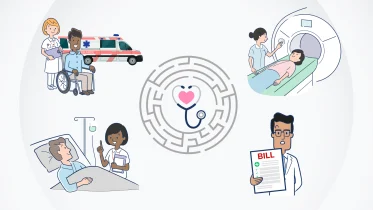What is healthcare fraud?
Overview
Healthcare fraud is a widespread problem in the Australian insurance industry, and it can have a negative effect on both health funds and their members.
Fraud can be perpetrated by an individual, a health care provider, or even a fund.
Fraud is damaging to everyone because it forces premiums up and makes the whole healthcare system less efficient.
Key Points
Healthcare fraud can be committed by individuals or healthcare providers. It costs the healthcare industry millions of dollars each year.
Healthcare fraud occurs when someone provides false information or withholds information in order to get a financial benefit.
If you suspect you have been the victim of healthcare fraud, report it to the appropriate authorities for investigation.
What is healthcare fraud?
Private Healthcare Australia defines health care fraud in three different ways:
Receiving a benefit payment where there is no legitimate entitlement
Submitting deliberately misleading or false information
Withholding relevant information
In other words, a person commits fraud when they intentionally set out to deceive in order to get financial benefits that are not theirs.
We'll go into more detail on the types of fraud in the next section.
Healthcare fraud is often referred to as 'claims leakage,' a phrase used by heath funds to avoid the complicated legal requirements associated with identifying fraud.
Fraud can be hard to identify without involving courts, which can lead to more expense for everyone involved.
There are so many cases of minor fraud that it's not beneficial for funds to follow them all up.
But what happens when you're the one being defrauded?
Is there any way to get your money back?
Don't worry, we'll get to that too.
But first, let's look at the different types of fraud.
Types of healthcare fraud
There are many types of healthcare fraud, from identity theft to overcharging for services.
Most types of fraud have one thing in common: either someone is providing false information or withholding information.
Here are some types of healthcare fraud to be aware of:
Types of healthcare fraud
Upcoding, or charging for more expensive service | Giving false diagnosis in order to bil for costly tests and services | Doctoring accounts to receive more financial benefits |
|---|---|---|
Billing items separately when they are supposed to be bundled together | Making false documents | Claiming for services that were not provided |
The University of Wollongong conducted research into healthcare fraud and found varying examples of fraud. In one case, health fund members were defrauded by a provider who used the details on membership cards to charge for services that were not provided.
The provider was part of a larger network, and the member's card was passed around and swiped by a number of providers that they weren't visiting.
The result?
The providers pocketed service fees from a health fund, while the members' benefit limits for those services reduced without their knowledge.
COMPARE & SAVEManaging healthcare fraud
Fraud thrives in the healthcare industry because it often goes unchecked.
In some ways, it's the system that is to blame.
Fees are charged for services, but these fees are often billed directly to the fund, who generally assumes that the bill is accurate.
Claims are often paid electronically without in-depth checks, which allows for inflated claims to be paid out.
Because of these gaps in the system, there is room for fraudulent behaviour, such as false diagnoses and 'overservicing,' or charging or claiming for services that weren't provided.
The Australian Government encourages consumers to report cases of fraud within the Medicare system, and investigates these reports.
The private health care system also works to prevent fraud and recover funds where possible.
However, the industry is unable to catch all instances of healthcare fraud.
Because funds don't know how much fraud is truly occurring, they are unable to allocate adequate resources to identifying and preventing it.
Although most people and providers do use health funds as they are meant to be used, there are some who don't.
To avoid being defrauded, you can keep an eye out for signs and report suspected fraud if you see it.
Spot the signs of healthcare fraud
So what are the signs of healthcare fraud and what can you do to prevent it?
Declining benefit levels
Take a few minutes each month to check your account to be sure that your benefit levels are where they should be. For example, let's say you have a $500 annual benefit for chiropractic services. Although you haven't visited the chiropractor, you notice that your remaining benefits are down to $300. This could be a sign of fraud.
Take note of any unusual mail you receive
Getting letters in your name for health services you haven't signed up for? This could be a sign that someone is using your identity fraudulently.
Request by a provider to leave behind your membership card
Providers swipe your membership card so you can claim on the spot for services, but there is no reason for them to keep your card.
Charges for additional services you didn't receive
This can be tougher to identify, as the bills are usually sent straight to the fund. But you can check your online account for evidence of 'over servicing'.
Unfortunately, not all fraud is easy to spot.
This is especially true for online identity theft; online services are convenient, but can also make you more vulnerable to fraud.
Keep your identification details safe to help prevent identity theft where fraudsters open online accounts in your name.
Report healthcare fraud
Suspect you or someone else is the victim of fraud?
Don't hesitate to report it. You can do so anonymously if you wish.
If the fraud is related to a health fund, contact your fund directly.
If the fraud is related to a health provider or practice employee, contact the Department of Health's Provider Benefits Integrity Hotline at 1800 314 808 or by completing an online tip-off form.
If the fraud is related to your treatment (for example, you suspect that unnecessary services were provided), contact the Australian Health Practitioner Agency (AHPRA).
The ACCC also publishes an up-to-date report on any scams that are doing the rounds.
Check the ScamWatch website for information on the latest scams.
It's important to be aware of healthcare fraud, but remember that most providers, funds, and members are doing the right thing.
Got questions about private health cover? We can help.
COMPARE & SAVEThis guide is opinion only and should not be taken as medical or financial advice. Check with a financial professional before making any decisions. Compare Club does not compare all products in the market. The availability of products compared may change from time to time. Not all products available from our partners are compared and not all products are available to all customers.





